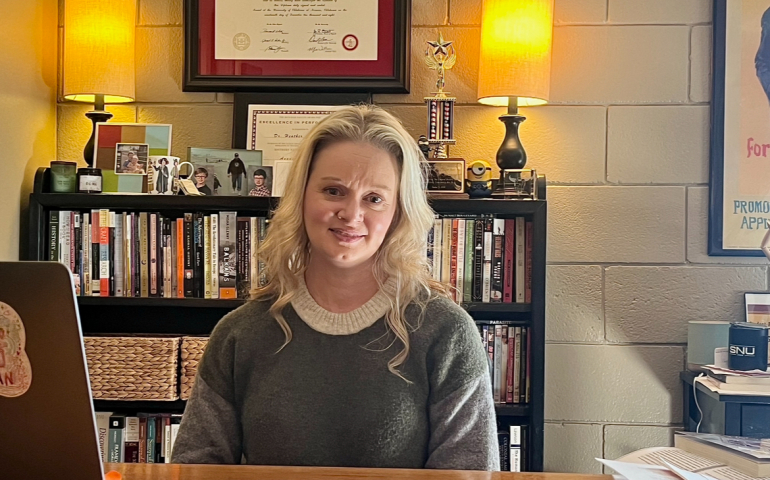Dr. Heather Clemmer wears many hats at SNU. These hats include being a history professor, the department chair, the General Education Director, the Faculty Athletic Representative, and a researcher. In my conversation with Dr. Clemmer, she shares how she juggles all her responsibilities, her research process, and the joys of her career.
Dr. Clemmer has been at Southern Nazarene University for 23 years, 5 years as an adjunct during her graduate studies, then 18 years as a full-time faculty member. Over the years, her career has changed quite a bit. When she first started as a professor she had to learn about the history and mission of SNU, how to advise well, and get acquainted with other areas on campus. As a new professor, she was assigned to the Student Life committee to learn more about that side of campus and build knowledge of the institution. Two years into her career, she was made department chair. After six years, she was also made the General Education Director. Then two years ago, she was made the Faculty Athletic Representative.
When asked how she has been able to manage all these responsibilities and adjust to new ones, she responded, “It’s a constant balancing act… but I love learning new things and how to use those new things. Each of those jobs has built off of the one that came before. Organizing a department schedule provided me with the skills I needed to understand how to build the general education schedule and work with other department chairs. Then, the Faculty Athletic Rep built off of the gen-ed position.” There’s a lot of work and preparation that goes into all that she does, but it has enabled her to build relationships across campus, listen to frustrations, and work to improve the experience of faculty and students.
A source of enjoyment for Dr. Clemmer is her research. She and Dr. Fitzgerald have been awarded the Wally Quanstrom Faculty Scholar Award, which is a grant to do research. Clemmer’s research project is over Mattie Mallory, founder of the Oklahoma Orphanage, which is now Bethany Children’s Health Center. In a book entitled, This Land is Herland: Gendered Activism in Oklahoma from the 1870s to the 2010s, Clemmer wrote a chapter on Mallory. Mattie Mallory also wore a lot of hats; she owned a newspaper, went into real estate in order to generate money for the orphanage, preached at revivals, taught at a school for children of freed Chickasaw men and women, and is considered to be one of the founders of BFC. At her orphanage, the children gained an education and learned basic knowledge about Jesus. Mallory believed these things were most important to be able to one day go out on their own and be self-sufficient, responsible, Christ-like citizens.
With the work that Clemmer has done on Mallory, she plans to write a book about Mallory that examines other women in the same sphere who are navigating life in a liminal state. However, there is still a lot of work to be done because there is not a definite narrative of Mallory. Clemmer anticipates that she will have to travel to the Nazarene Archives in Kansas City to learn more about Mallory’s background. Travel, as well as access to the archives, are fortunately funded by the grant. Some other questions she seeks to answer include what it was like in early OKC, who the other women were who joined Mallory, and what happened to these women once Oklahoma became a state and rules that worked against women were enforced. There is so much more for Clemmer to learn and uncover. She mentions that historical research is very different from the hard sciences; scientists undergo a series of experiments to come to a result, whereas historians have to dig through tons of documents that are unorganized and make sense of it. She states, “We can’t bend history to fit the narrative we want. These people aren’t alive to change the choices they made, so we have to use the truth in the document and tell a story using their voices.”
Clemmer and I ended the conversation on what has been her favorite thing about her job. As the Social Studies Education Director, she gets the opportunity to oversee students who want to be history teachers. Over the students’ undergraduate career, Clemmer gets to walk alongside and see their development as they transform from unsure freshmen to strong, capable students ready and excited to teach. She mentioned that some graduates are even her kids’ teachers! She has loved being able to encourage the next generation to be learners and hopes to continue making an impact on the SNU campus and beyond.
Photo by Victoria Peter
